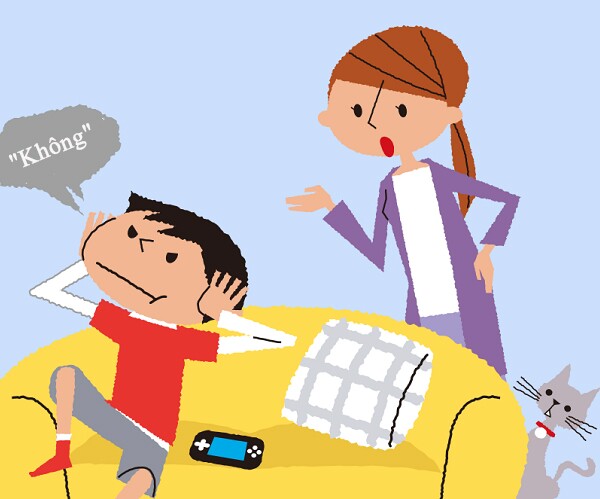Some children feel safer and more comfortable at home, leading to freer self-expression. In public, however, they need to follow social rules and norms. Children also learn by observing their parents’ behavior; if parents are inconsistent or rude, children will mimic this behavior.
Additionally, some children are still developing their emotional regulation skills. They may act out and be rude at home when feeling angry or disappointed.

Illustrative image.
Regardless of the reasons behind rude behavior, it can lead to conflicts between parents and children, and children may struggle with managing their emotions and behavior.
Inconsistent behavior can confuse children, leading to low self-esteem or anxiety about how they are perceived. Therefore, parents need to set clear rules for both home and social situations. Explain to your children that good manners and polite behavior are essential in all circumstances.
Educating children requires a comprehensive and patient approach. Through support and guidance, children will learn appropriate behavior and develop into confident individuals with strong social skills. On this topic, psychologist Quang Thi Mong Chi provides analysis and suggestions for parents on how to adjust their parenting methods appropriately.

Psychologist Quang Thi Mong Chi.

Expert, why do many children have such contrasting behavior?
This phenomenon is not uncommon and can be explained from the perspective of developmental and behavioral psychology. In reality, a child’s different behavior at home and in public reflects various factors:
Firstly, children feel “safe” at home to express their negative emotions. Home is where children feel attached and know that even if they misbehave, their parents will still love and forgive them. As a result, children tend to “release” their pent-up emotions or react more strongly with family members, which they wouldn’t dare do outside for fear of judgment.
Secondly, children learn to adjust their behavior according to social contexts. Today’s children are intelligent and highly perceptive of their environment.
When at school, in public places, or in front of strangers, children understand the norms of behavior and know that they need to be polite to receive praise or avoid criticism. Their polite behavior towards strangers may result from being taught the formalities without a deeper understanding of genuine respect, especially towards family members.
Thirdly, some children grow up in an environment where parents set few limits and are inconsistent in their parenting approaches. If children have repeatedly shown rude behavior towards their parents without facing serious consequences, they may consider it “normal.” Meanwhile, they are taught to maintain the family’s reputation or fear judgment from strangers, leading to opposite behavior in public.
Lastly, children may be reacting to internal stress or tension within the family. If there are factors such as academic pressure, high parental expectations, a lack of listening, or conflicts in the home, children may act rudely as a form of rebellion or a way to express their unresolved emotions.

Can a child’s rudeness at home be a way of expressing emotions or internal stress?
Absolutely. From a psychological perspective, rudeness in children – such as backtalk, speaking without respect, shouting, or displaying annoyed attitudes – is often not just a matter of “misbehavior” or lack of discipline, but also an indirect expression of negative emotions that have not been adequately addressed.
Unlike adults, children often lack the vocabulary, emotional awareness, or self-regulation skills to manage their emotions effectively. When stressed, angry, upset, or anxious, children may express these emotions through negative behavior. The family, being the most familiar environment, often becomes the place where children “release” their emotions most intensely.
Children’s stress can come from various sources: academic pressure, peer conflicts, teacher reprimands, high parental expectations, or even minor events that adults may consider “insignificant.”
If children don’t feel heard or don’t know how to express themselves, they may turn their stress into rude behavior. Additionally, this could be a sign of underlying emotional distress. If rude behavior persists and intensifies, parents should consider whether their child is struggling with emotional issues such as anxiety, mild depression, or a sense of isolation within the family. In such cases, punishment is not the solution; instead, focus on understanding, connecting, and providing emotional support.

Can you explain the role of parental behavior modeling in shaping children’s manners and respect for others?
Parents serve as behavioral models for their children, influencing their emotional control and behavior. This is considered a crucial factor in developing manners and respect – or the lack thereof – in children.
According to Albert Bandura’s social learning theory, children primarily learn behavior through observation and imitation of those around them, especially their parents and family members.
If parents consistently speak gently, respect each other, apologize, and express gratitude, children will internalize and replicate these behaviors naturally.
On the other hand, if children frequently witness their parents shouting, mocking, scolding, or speaking disrespectfully to others – including the children themselves – they may view such behavior as “normal” when dealing with their own emotions.
Children may carry these learned behaviors into their daily interactions, especially when stressed or feeling misunderstood. Behavioral models also influence how children define “respect.” Many parents demand that their children “be respectful to elders,” but they may not treat their children with the same level of respect or consistency in responding to rude behavior.
This contradiction can lead children to behave situationally, coping or rebelling instead of genuinely understanding the value of respect.
A child raised in an environment with positive discipline, fairness, and listening skills, where parents model respectful behavior, will internalize better values regarding respect, self-control, and politeness – not only towards strangers but also towards family members.

How can we prevent our children from becoming strangers within their own families as they grow up?
This is a deep concern for many parents in today’s fast-paced world, where generational gaps and social pressures are eroding family bonds. A child becoming quiet, withdrawn, and less communicative with their parents is not a random occurrence but the result of a prolonged lack of emotional connection and understanding.
To maintain a strong parent-child relationship, the first and most important step is for parents to establish an emotional foundation early on. Children need to be nurtured not just physically but also emotionally.
Daily conversations should go beyond academics, grades, or responsibilities and include caring inquiries such as: “Did anything make you happy today?” “Is there anything bothering you?” “When you were angry earlier, I wanted to understand more – would you like to talk about it?” This approach helps children feel safe expressing their emotions without fear of judgment or dismissal.
Additionally, parental presence should be understood as “being truly present,” not just physically present. A father sitting next to his child while glued to his phone or a mother cooking and shouting at her child to do homework creates a physically close but emotionally distant environment.
Children need quality time – family meals without rush, shared games or walks, or simply quiet moments without feeling lonely.
Respecting children as unique individuals is another crucial foundation. Many loving parents may not listen to their children’s opinions or impose their own thoughts without considering the child’s desires.
Children should be asked for their input on age-appropriate matters, allowed to express their perspectives, and given the freedom to make mistakes – as long as they are made within a loving and safe environment. When respected, children learn to respect others and view their family as a place of genuine value.
Moreover, every parental behavior is a living lesson for children. When parents treat each other kindly, express gratitude, apologize, listen, and control their anger, children naturally absorb these positive qualities.
Conversely, if children grow up in an environment filled with criticism, control, emotional distance, or verbal abuse, they will struggle to feel genuine love, even if parents preach manners and respect.
Finally, the bond that keeps a child connected to their family for life is the feeling of unconditional love. Not just when they are well-behaved, academically successful, or a source of parental pride, but also when they stumble, differ, disappoint, or fail to meet expectations.
A child who always feels accepted for who they are, even when they stray far, will always want to return home. To them, home is the safest place, where they can let down their guard and be embraced without needing many words.
“4 Magical Phrases to Use When Your Child Argues Back: A Guide for Parents”
“The Power of Effective Communication: Transforming Defiant Children into Obedient Angels.
As parents, we hold the key to unlocking our children’s potential for obedience and respect. Our communication style plays a pivotal role in teaching our defiant little ones to become more compliant and understanding.”






































